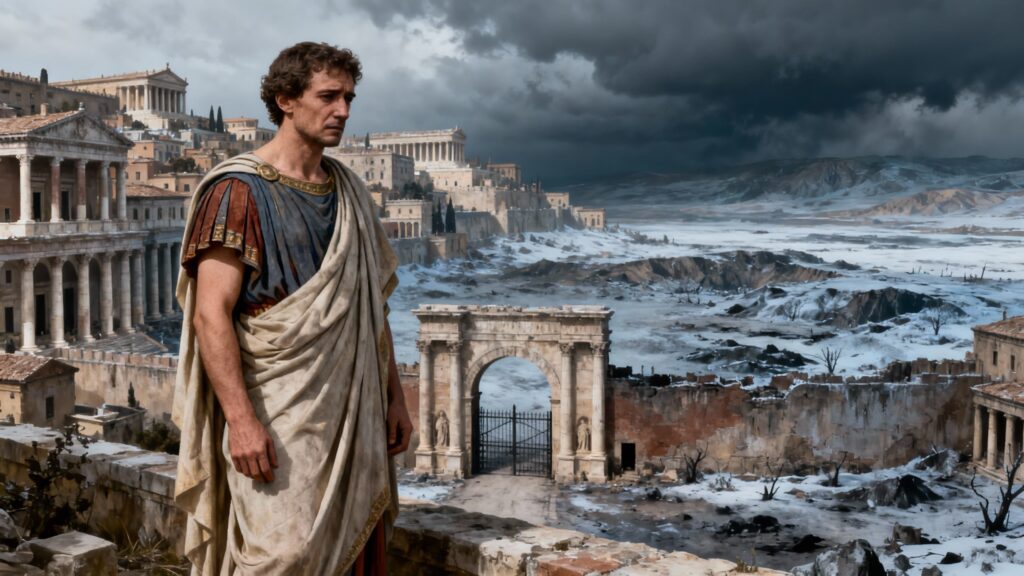Exile in Rome was a powerful form of punishment used to remove individuals from the center of Roman political and social life without killing them. Known as exsilium or Roman banishment, this penalty involved being forced to leave the city or empire, losing rights, property, and status.
Exile did more than just change where someone lived. It deeply affected their life and identity, cutting off connections with family, political power, and cultural involvement. Those who were exiled faced not only legal consequences but also the emotional burden of being rejected by society and uprooted from their home.
The impact of such a severe punishment went beyond personal effects; it also had an impact on the wider trade and economy in ancient Rome, which were crucial to its vast empire. By understanding these complex systems, we can see how economic practices played a significant role in shaping one of history’s most powerful civilizations.
This article explores Famous Exiles in Rome: Lives Changed by Banishment from the Capital, revealing how exile shaped destinies and reflected broader dynamics within Roman society.
The Legal and Social Framework of Exile in Ancient Rome
Exile in the Roman legal system was a complex form of punishment with different variations and consequences. It had two main forms:
- Voluntary exile (exilium): This was often chosen by the accused as a way to avoid harsher penalties like death.
- Forced exile: This type of exile was imposed by the Senate or emperor as a judicial sentence, forcing someone to leave Rome or even the entire empire.
The Penalties Associated with Exile
The penalties associated with exile went beyond just being physically removed from the city. The legal consequences could be severe, including:
- Loss of Roman citizenship: Exiles lost their rights as citizens, which meant they could no longer participate in politics or have legal protections.
- Confiscation of property: The assets of exiles were often seized or redistributed, cutting off their financial support.
- Prohibition against returning: If an exile returned without permission, they could be executed or face further punishment.
One particularly harsh legal penalty was the interdictio aquae et ignis, which literally denied the exiled access to water and fire. This punishment symbolized complete exclusion from Roman society and made individuals outlaws without any legal standing or basic necessities for survival within Roman territory.
The Social Effects of Exile
In addition to these legal consequences, exiles also faced social rejection. Their family, friends, and political allies would reject them, further isolating them from cultural events, patronage systems, and social networks that defined status in Rome.
This framework shows that exile was more than just a punishment; it was a tool used to legally and socially dismantle an individual’s identity. When someone lost their citizenship rights and social connections, they lived a life that was profoundly changed—not only physically displaced but also culturally and psychologically cut off from their previous world.
The enduring legacy of Roman law has shaped modern legal systems significantly, demonstrating how this ancient practice continues to influence contemporary society. Furthermore, the influence of Roman society on Western civilization is evident in various aspects of modern life, from legal systems to cultural practices.
Political Motivations Behind Exile
Exile in Roman politics was used as a strategic tool to maintain control and influence public morality. During the reign of Augustus, it became an important way to consolidate power without resorting to more violent measures like execution. Augustus aimed to stabilize the empire after years of civil war, and exile served to quietly yet effectively remove potential rivals or dissenters from Rome’s political scene.
Key aspects of exile as a political tool under Augustus include:
- Suppressing opposition: Exile removed influential individuals who threatened the emperor’s authority or challenged his vision for Rome’s future.
- Enforcing moral standards: Augustus promoted laws aimed at restoring traditional family values and public decency. Those accused of moral wrongdoing—especially members of the elite—faced exile as both punishment and warning.
- Public example: Banishment demonstrated the consequences of disloyalty or immorality, reinforcing Augustus’ image as a ruler committed to order and virtue.
- Avoiding martyrdom: Unlike executions that could provoke public sympathy, exile distanced offenders physically and symbolically, reducing their ability to inspire resistance.
The case of Julia Augusta, Augustus’ own daughter, illustrates this political use of exile clearly. Her banishment on charges of adultery sent a powerful message about the seriousness with which Augustus treated moral conduct within his family and among Rome’s ruling class.
Exile thus operated not only as a legal penalty but also as a calculated move within Roman politics—a way to safeguard the emperor’s position while shaping societal norms according to his ideals. However, this strategy was not without its flaws. The reliance on exile as a political tool highlighted the political instability and weak leadership that plagued Rome during this period.
Moreover, the use of coins as propaganda during Augustus’ reign further exemplifies how power was maintained through strategic messaging. These coins served not merely as currency but also as instruments for conveying authority and legitimacy.
Additionally, the evolution of Roman sculpture, which focused on realism and the portrayal of power, served as another means of political propaganda during this era.

Case Study 1: Ovid – The Poet’s Fall from Grace
Ovid stood among the most celebrated poets of his time, enjoying the vibrant cultural and social life of Rome. His works, including the Metamorphoses and Amores, earned him widespread acclaim. His presence in Roman literary circles was prominent, positioning him as a key figure in Augustan Rome’s artistic landscape.
The event that abruptly altered Ovid’s trajectory was his exile to Tomis, a remote outpost on the Black Sea. This banishment remains one of the most famous cases of Ovid exile. The exact reasons behind Emperor Augustus’ decision are shrouded in mystery. Ovid himself cited two causes: carmen (a poem) and error (an error or offense). Scholars typically link the poem to The Art of Love, a work seen as controversial and potentially subversive to Augustus’ moral reforms. The nature of the “error” remains speculative, fueling debate about political intrigue or personal scandal.
Tomis banishment represented a harsh punishment both physically and culturally. The city was a distant frontier town, far removed from Rome’s sophistication. In exile, Ovid endured isolation, cold climate, and hostility from locals unfamiliar with Roman customs. His poetry from this period—Tristia and Epistulae ex Ponto—expresses deep despair and longing for Rome:
“I who once sang of love now sing of tears.”
These works reveal the psychological toll exile took on Ovid, capturing his struggle to maintain identity and dignity despite banishment. Life in Tomis stripped him not only of status but also severed vital connections to family, friends, and cultural life central to his identity as a Roman poet.
This case exemplifies how exile functioned as a tool capable of transforming lives dramatically, marking Ovid exile as one of the most poignant examples among Famous Exiles in Rome: Lives Changed by Banishment from the Capital.
Case Study 2: Julia Augusta – Exile Amidst Scandal
Julia Augusta, daughter of Emperor Augustus, had a special role in the Roman imperial family. Her life shows how exile in ancient Rome was used not just for political reasons but also to enforce strict moral rules, especially among the ruling class. Julia’s banishment was closely connected to accusations of adultery—an act that brought personal disgrace and also affected the reputation of the dynasty.
Key aspects of Julia Augusta’s exile:
Status and expectations: As Augustus’ only biological child, Julia was expected to embody the emperor’s vision of Roman virtue and familial honor. Her conduct was a reflection of the moral standards Augustus sought to promote throughout the empire.
Charges of adultery: Historical sources report multiple accusations against Julia for engaging in extramarital affairs, which were considered a serious breach of both personal and public morality. These scandals threatened Augustus’ efforts to solidify his regime’s legitimacy through family discipline.
Political and social consequences: Banishment removed Julia from the center of power and public life. She was sent away from Rome, severing her ties with influential networks and diminishing her influence within imperial circles.
Moral enforcement tool: Julia’s exile served as a stark warning to others in Roman society about the consequences of violating social norms. This action reinforced Augustus’ legislative agenda focused on restoring traditional family values.
The exile had a deep impact on Julia’s sense of self and her standing in society. Her loss of favor showed how closely connected politics and morality were in ancient Rome—especially for those born into power. The scandal involving Julia Augusta is one of the clearest examples of how exile was used not just as punishment but also as a way to control the behavior of the elite within the Roman imperial family.

The Personal and Cultural Impact of Exile on Prominent Romans
Exile in ancient Rome was more than just being physically removed from the city. It was a severe break from established social networks and cultural life, taking away individuals’ familiar identities and roles. For prominent Romans, exile meant:
- Severing ties with family and political allies, often leaving exiles isolated from the support systems that had sustained their status and influence.
- Facing social ostracism that marked them as outcasts within Roman society, worsened by legal penalties such as interdictio aquae et ignis which declared them outlaws denied basic rights.
- Experiencing profound cultural displacement. Removed from the intellectual vibrancy and public life of Rome, exiles lost access to theaters, forums, libraries, and social gatherings that shaped their identity.
The psychological impact was huge. Figures like Ovid provide vivid testimony to this despair through their writings. His poetry reveals:
“A cold shore, unfriendly skies – all stand against me,”
expressing deep loneliness and longing for the cultural richness he once knew. The loss of participation in Rome’s artistic and literary circles added layers of alienation beyond physical exile.
Isolation also extended into the personal realm. Family relations could be strained or severed entirely. Political careers abruptly ended, leaving individuals without purpose or influence. This combination of despair, loss, and disconnection made exile one of the harshest punishments in Roman society—not just a banishment from place, but from identity itself.
Moreover, the spiritual aspect of Roman life was deeply connected to their societal structure. The rituals and sacrifices performed to connect with their gods were not only religious acts but also a way to reinforce social bonds and personal identity. Exile took away these connections to the divine as well, further deepening the sense of loss experienced by those banished from their homeland.
The Role of Geography in Shaping the Experience of Exile
The location of Tomis is a clear example of how geography influenced the experience of exile for many Romans. Unlike the busy and diverse city of Rome, with its public squares, theaters, and lively social scene, Tomis was a distant outpost on the empire’s northeastern border, next to the Black Sea. This difference was more than just physical; it represented a significant shift from the center of Roman civilization to a place seen as harsh and uncivilized.
Key aspects that defined exile in places like Tomis:
- Harsh Conditions: Tomis was known for its cold weather, unfamiliar customs, and relative isolation. Exiles faced not only environmental challenges but also cultural barriers. The local population spoke different languages and followed customs far removed from Roman traditions.
- Isolation from Roman Life: Being banished to such frontier territories meant losing access to political networks, family, and friends. The physical distance emphasized the social and emotional separation experienced by exiles.
- Symbolic Banishment: Sending someone to Tomis or similar border areas was a deliberate statement. It marked the individual as an outsider, cast away from Rome’s protective cultural and legal systems. This punishment went beyond mere removal—it represented a fall into obscurity and marginalization.
- Cultural Displacement: Exiles like Ovid mourned their forced stay in places where Latin literature, art, and Roman social rituals were absent or scarce. Such deprivation deepened feelings of being an outsider.
The geography of exile played a crucial role in making it more severe. Being uprooted from the center of Rome to distant places like Tomis physically showed an exile’s loss of status and identity within the Roman world. This geographic aspect added to the personal tragedies experienced by famous exiles in Rome: lives changed by being banished from the capital carried both real hardships and symbolic meaning connected to their location.

Conclusion
The practice of exile in ancient Rome had a profound impact that extended beyond the personal tragedies of individual lives. It functioned as a powerful mechanism for state control, enabling rulers to enforce political authority and moral order by removing dissenting voices or scandalous figures from the heart of Roman society. This form of punishment reshaped destinies by severing social, cultural, and familial ties, forcing exiles into harsh and often unfamiliar environments.
Famous Exiles in Rome: Lives Changed by Banishment from the Capital reveal how exile was both a personal loss and a political tool. The stories of Ovid, Julia Augusta, and others offer unique perspectives on Roman power dynamics and the human cost behind state decisions.
Explore the literary works of exiled figures like Ovid to gain deeper insight into their experiences, emotions, and enduring legacy beyond the walls of Rome. Their voices continue to illuminate the complexities of exile as a transformative force in history.
The masterpieces of Roman art, emerging from the confluence of various cultures, serve as a testament to the empire’s vast reach and its ability to assimilate and innovate. Spanning several centuries, this artistic tradition reflects not only the aesthetic values of its time but also the social, political, and cultural dynamics that shaped the Roman world.
Moreover, understanding the power and strategy of the Roman military can provide further insights into how such a vast empire was maintained. The Roman military machine was not merely a collection of soldiers; it was a well-oiled apparatus that combined discipline, strategy, and innovation.
Lastly, delving into the Roman Pantheon unveils the gods of power, justice, and wisdom that influenced the lives of its people. This diverse collection of gods and goddesses reflects the values, beliefs, and customs that were integral to ancient Roman society.
FAQs (Frequently Asked Questions)
What was exile in ancient Rome and how did it affect individuals?
Exile in ancient Rome was a form of punishment that involved banishment from the capital, stripping individuals of their status and profoundly altering their lives and identities. It not only removed them from political and social life but also imposed legal consequences such as loss of citizenship and property rights.
How did the Roman legal system differentiate between types of exile?
The Roman legal framework distinguished between voluntary exile, where an individual chose to leave to avoid harsher penalties, and forced exile, which was imposed as a legal punishment. Both forms entailed significant social ostracism, with severe penalties like interdictio aquae et ignis effectively cutting exiles off from basic societal resources.
In what ways was exile used as a political tool during Augustus’ reign?
During Augustus’ rule, exile served as a strategic political instrument to consolidate power and enforce moral order. It was employed to remove political rivals or those deemed morally corrupt, thereby maintaining the stability of the regime and upholding strict social norms within Roman society.
Who was Ovid and what led to his exile in Tomis?
Ovid was a prominent Roman poet whose sudden exile to Tomis marked a dramatic fall from grace. His banishment is linked to the controversial nature of his work ‘The Art of Love’ and ambiguous political or personal circumstances. In Tomis, Ovid faced harsh conditions and profound isolation, which he poignantly expressed through poetry written during his exile.
What were the circumstances surrounding Julia Augusta’s exile?
Julia Augusta, daughter of Augustus, was exiled amidst scandal involving allegations of adultery. Her banishment reflected the strict moral standards upheld within the Roman imperial family and had significant personal repercussions, highlighting how exile functioned as both punishment and a means to enforce familial and societal discipline.
How did geography influence the experience of exile for Romans like Ovid?
Geography played a crucial role in shaping the exile experience. Exiles were often sent to remote frontier territories like Tomis, far from cosmopolitan Rome. These locations symbolized isolation and cultural displacement, exposing exiles to harsh living conditions and severing their ties with familiar social and cultural networks.

